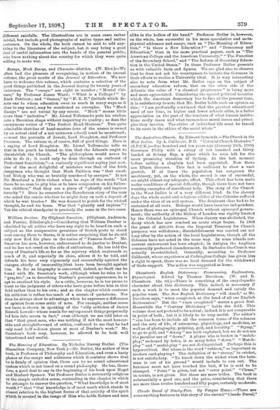William Dunbar. By Oliphant Smeaton. (Oliphant, Anderson, and Ferrier, Edinburgh.)—Considering
that William Dunbar is admitted by all critics who have any right to be heard on such a subject as the comparative greatness of Scotch poets to stand next among them to Burns, it is rather surprising that he should only now find his place in the series of "Famous Scots." Mr. Smeaton has now, however, endeavoured to do justice to Dunbar, and he has not erred on the side of enthusiasm. He has told the story of Dunbar's life so far as the mystery which enshrouds so much of it, and especially its close, allows it to be told, and defends his hero very vigorously and successfully against the charges, chiefly of immorality,Ithat have been brought against him. So far as biography is concerned, indeed, no fault can be found with Mr. Smeaton's work, although when he tries to be " graphic,"_as in describing Dunbar's personal appearance, he is apt to overload his style. As a critic, however, he is too prone to trust to the judgment of others who have gone before him in this field rather than to his own ; and so the chapter which contains his criticism is rather too much of a mosaic of quotations. Nor does he always show to advantage when he expresses a difference of opinion from some critic of note. For example, neither sense nor taste is shown in speaking of the "silly criticism of James Russell Lowell—whose mania for saying smart things perpetually led him into errors in fact," even although we are told later on that "that great man, who was nothing if not the most honour- able and straightforward of critics, confessed to me that he had only read half a-dozen pieces at most of Dunbar's work." Mr. 8meaton's book may, however, be allowed to be both well intentioned and useful.


































 Previous page
Previous page